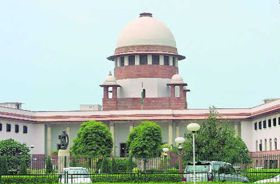Salil Desai
Pune-based author and filmmaker
As March 31 draws nearer, for those who have still chosen to not link their Aadhaar numbers to their mobile numbers, bank accounts, mutual funds portfolio and so on, the day starts with multiple SMSes, urging, rather warning, them to do so immediately.
Never mind that the Supreme Court is still hearing the matter on whether the government can make Aadhaar mandatory in this all-encompassing manner, which will forever yoke our lives and everything we do, to this 'ultimate' proof of identity.
There are several arguments against the linking of Aadhaar being made mandatory — ideological, legal, practical, political, technological, philosophical and even cynical. While one hopes that the Supreme Court will once again find a way to balance the complex considerations to uphold the true spirit of liberty as it did in its judgment on privacy as a fundamental right, the fact is that the Modi government has largely succeeded in its objective of making the majority of citizens surrender their personal information to the state.
This objective has been achieved by subliminal coercion because the messages bombarding us carry an implicit, menacing hint that we will no longer be able to access our own hard-earned money in bank accounts, or that we will lose our mobile numbers and various other facilities and services of modern life; that we will be effectively disenfranchised as citizens in a variety of ways, which will make normal living next to impossible. Moreover, the government is self-righteously demanding these sweeping informational rights over each and every aspect of our lives by pegging it to virtuous national imperatives of security, outing black money, eliminating corruption, improving governance etc.
What the final contours of the Supreme Court judgment will be is yet unknown, but by the time it comes, the bulk of Indian citizens would have submitted to this form of official data capture and comprehensive linkage for a lifetime, which might be impossible to undo. What then would be the use of a liberal judgment to a common citizen if it is impossible for him to delink himself from this government monitoring mechanism if he so chooses? What is the guarantee that his data will be erased permanently on request, if the judgment empowers him thus? Is it even technologically possible to destroy digital data permanently in this manner, or will some government department or political party still be able to retain or access a cached, archived or classified file, if they wish to?
Conversely, if the Supreme Court decides in favour of the government, then it might forever transform our relationship with those who politically rule over us. Indeed, it could mean we truly become subjects, because of the undemocratic way this government thrust Aadhaar down our throat — changing the basic nature of Aadhaar, as originally conceived, from voluntary to mandatory, getting it brazenly passed through Parliament as a money Bill and finally expanding its scope to reach deep into our lives and making it into a kind of digital leash that can be potentially activated at any time to track us under the pretext of governance and security.
The original compact with the government was that if we wish to avail of any subsidies or financial benefits from the state, we should enrol for Aadhaar, apart from it becoming an identity card. The nature of the relationship was transactional, fair and voluntary. Now however, we have to mandatorily enrol for Aadhaar whether we want to avail ourselves of any state subsidies or not and also surrender vast amounts of personal information without any commensurate direct benefits coming to us as citizens in return. In fact, we end up with the very real possibility of losing the right to choose what to keep personal and what not to. What does it matter if you have nothing to hide? It still doesn't mean the government has a right to collect personal data that may enable it to profile you, because there is no end to what the state might want to know about you next, ostensibly in pursuit of some lofty national objective. Already there is a PIL filed in the Supreme Court pushing for Aadhaar linkage to election cards, which makes one wonder how secret will our sacred right to secret ballot remain.
If not for any other reasons, it is for this creeping, legalised invasion alone that we as voters need to make it a 2019 election issue, so that it sends out a message to all political parties and future governments that the state has no right to attempt to turn us into subjects.
How can any government subtly threaten honest, taxpaying citizens that they will be deprived of access to their own money? Besides, why should we reward government inefficiency? Most taxpayers have already linked their Aadhaar numbers to their PAN cards, while filing returns last year. IT returns already have our bank account numbers, details of financial dealings, along with our telephone numbers and email IDs. So, why should the onus be on us to provide more cross-verification linkages? Every time we purchase shares or property, high-value items, we anyway provide our PAN numbers. So can't all that data be collated from different systems by government departments and agencies, instead of brow-beating us into providing it all under Aadhaar?
Anyhow, given the long history of abuse of power, authority and information by the state, by bureaucrats and administrative machinery, by politicians and political parties, not just in India but all over the world, wouldn't it be a folly to give any government, of any party, another potential tool to harass common people with? Surely this needs to be debated vigorously in the build-up to the 2019 elections.



























